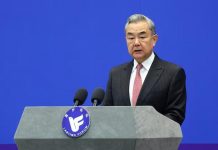Africa-Press – Eritrea. Last Friday, the US Department of the Treasury’s Office imposed unilateral sanctions against Eritrean individuals, national institutions, and government entities in connection with the ongoing crisis in Ethiopia. The move is not only unlawful and unjust, it will also prove counterproductive to the cause of peace, justice, and stability in the Horn of Africa.
To begin, the adoption of unilateral coercive economic measures by the US is a flagrant breach of the fundamental principle of sovereign equality in international law and violates the basic norms of international relations as enshrined in the United Nations Charter, countless United Nations General Assembly resolutions, charters of various regional organizations, such as the Charter of the Organization of the American States and the Constitutive Act of the African Union, and numerous international treaties, including the Vienna Convention on the Law of Treaties. As stated unequivocally in Chapter VII of the United Nations Charter, it is the United Nations Security Council, – and only the United Nations Security Council – that may impose measures including, “interruption of economic relations and of rail, sea, air, postal, telegraphic, radio, and other means of communication.” Additionally, according to a report by the Asian-African Legal Consultative Organization, imposing, “unilateral and secondary sanctions on countries through the application of national legislation is not-permissible under international law.” Accordingly, no nation-state – large or small, powerful or weak, rich or poor – has the legal right to completely bypass multilateral institutions and impose sanctions against another.
There are other problems, as well. As put by an Eritrean government press release published in response to the sanctions, “The primary aim of the illicit and immoral sanctions is to inculcate suffering and starvation on the population so as to induce political unrest and instability.” Notwithstanding rhetorical flourishes and supposedly sympathetic declarations by the US that, “the sanctions are not aimed at harming the Eritrean people,” the simple fact is that the sanctions come amidst the COVID-19 pandemic and significant associated socio-economic challenges at home and across the region. Thus, they can only be expected to intensify and spread hardship.
What’s more, is that the sanctions are a denial of individuals’ and the country’s fundamental right development. On this point, just months ago, international legal and rights experts explained that:
“Sanctions hold countries back from development, they hold back people as well, and in a globalizing world, that hurts everyone. Sanctions make it harder for entire populations to stay healthy and hamper the transportation of goods needed for economic development, resulting in the waste of natural resources, [and] undermining environmental sustainability and achievement of the Sustainable Development Goals. Activities essential to every country’s development suffer when unilateral sanctions are imposed.”
In addition to all the above, the US sanctions are unjust and represent a clear attempt to shift blame for the current crisis in Ethiopia. Following years of sowing violence and chaos, as well as considerable military preparations, the TPLF staged a massive, unprovoked attack on all outposts of Ethiopia’s Northern Command in early November 2020. It also launched missiles on heavily populated civilian areas in Eritrea, including the capital, Asmara, and killed scores of Eritrean migrants. Then when the Ethiopian government announced a unilateral ceasefire earlier this year, the TPLF responded by attacking the neighboring regions of Afar and Amhara, committing atrocities, looting humanitarian aid and property of civilians, conscripting children, and conducting a “scorched earth” policy. In recent weeks, the group has also repeatedly threatened to advance on Addis Ababa, attack foreigners, and once again invade Eritrea.
There is no controversy as far as the need for accountability and justice is concerned in any war. Although it is imperative to take a critical view of and closely scrutinize all actors within conflicts, it is beyond any reasonable contention that the TPLF and its reckless, criminal actions have precipitated, prolonged, and expanded the crisis in Ethiopia. Sanctioning Eritrea is scapegoating, pure and simple. However, it also essentially condones the TPLF’s actions and gives the group little incentive to actually cease its violent campaign. Most likely, the group will only be emboldened by and find great encouragement in the latest US move – thus meaning that the deep suffering of many innocent people – in Ethiopia, Eritrea, and the region – will persist.
It should also be pointed out that although the US stresses the paramount importance of maintaining regional peace and stability in the Horn of Africa, it is Eritrea that has borne, for almost two decades in the recent past, the brunt of the violence, suffering, and destruction that has ensued from perennial conflict and mayhem. The basic fact is that the US extended support to the TPLF – the primary force culpable for this state of affairs – through massive economic assistance and political cover. At this stage, the US cannot, with any modicum of legitimacy, claim the moral high ground and seek to pontificate to or judge Eritrea. Nor can it, of course, speak for the Government of Ethiopia, which has never lodged any grievances to the international community in regard to Eritrea and instead continues to implore the international community to strongly condemn the TPLF and target it for tough actions.
Indeed, the US imposition of sanctions on Eritrea is not only unlawful, unjust and a clear case of scapegoating, but it also threatens to embolden and encourage the TPLF’s reckless campaign of violence.
For More News And Analysis About Eritrea Follow Africa-Press







